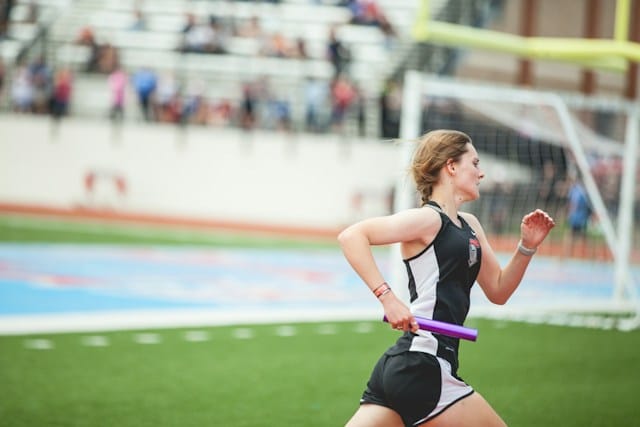As an athlete, you’re familiar with competition. You constantly push your bodies to new levels, always pursuing the next victory. But there’s a different kind of challenge you might be grappling with, and it doesn’t take place on the field, court, or track. It happens in the classroom. In a world that increasingly necessitates advanced education for future success, elite athletes must juggle the demands of their sport with the rigor of academia. The balancing act of training and education is a high wire walk that our top athletes take on with remarkable grace and precision. But how do they do it?
The Importance of Education for Athletes
Education is a crucial part of an athlete’s development. The classroom is as much a training ground for athletes as the gym or the field. The intellectual skills developed in school, like critical thinking, problem-solving, and the ability to work as a team, can help athletes on and off their sports fields.
A voir aussi : What Are the Challenges in Providing Equal Opportunities for Athletes in Remote Areas?
Studies show that student athletes often perform better in school than their non-athlete peers. A report by Google Scholar revealed that the discipline, focus, and time management skills developed through sports positively impact an athlete’s academic performance. However, the challenge is maintaining this balance when the demands of elite sport and high-level academia collide.
A robust support system is vital in helping athletes manage this balance. Coaches, teachers, and families play a significant role in an athlete’s academic and athletic journey.
A lire aussi : What Are the Best Strategies for Managing Stress and Burnout in Professional Coaches?
The Role of Coaches
Your coach isn’t just there to help you improve your game. They’re an essential part of your support system, guiding you through the complex world of elite sports and academic requirements.
A good coach understands that you are a student-athlete, with the emphasis on ‘student’ first. They know that your long-term health and success depend on your education. They help you balance practice schedules with school deadlines, ensuring that neither area suffers.
Coaches also lead by example, demonstrating the discipline and dedication required to excel in sport and academics. They instill in you a love for learning and a respect for education, showing that education and athletics are not mutually exclusive but complementary aspects of personal development.
Navigating High School as an Elite Athlete
As an elite high school athlete, your sports commitments might seem like they’re swallowing your entire schedule. Between early morning training, after-school practices, and weekend games or competitions, it may feel as though there’s no time left for school.
Yet many high school athletes successfully navigate this demanding schedule. They do so by implementing excellent time management strategies, prioritizing their tasks, and ensuring they have a solid support system in place.
Many high schools are also recognizing the unique challenges faced by student-athletes and are developing programs to support them. These include offering flexible class schedules or providing tutors to ensure student-athletes can keep up with their academic workload.
The Student Athlete at University
The balancing act becomes even more intricate at the university level, where the stakes in both sports and academics are higher. University athletes often deal with a more demanding sport schedule, increased travel for competitions, and more rigorous academic workload.
Universities have developed support systems to help student-athletes manage these pressures. Most universities with athletic programs have academic support services specifically designed for student-athletes. These services often include academic advising, tutoring, and study groups, designed to accommodate the unique schedule of a university athlete.
Moreover, many universities have begun using technology to help student-athletes succeed academically. For instance, online classes allow athletes to complete coursework at times convenient for their training and competition schedules.
Lessons from Elite Athletes
Elite athletes often share common traits that contribute to their success in sports and academics. They’re goal-oriented, disciplined, and understand how to manage their time effectively.
They also lean on their support networks. Coaches, teammates, teachers, and families all play a role in helping athletes stay on top of their game and their grades. Athletes also understand the importance of taking care of their mental and physical health.
In interviews, many elite athletes have emphasized the importance of maintaining a schedule and sticking to it. However, they also stress the need for flexibility, understanding that sometimes, adjustments need to be made.
As elite athletes, you already possess the determination and focus required to excel in your sport. By applying these traits to your education, you can ensure a bright future, regardless of whether it’s on the field or off.
Balancing Act in Professional Athletics
Transitioning into professional athletics introduces a new level of intricacies in the balancing act between sports and education. Often, professional athletes must continue their education whilst adhering to rigorous training schedules, frequent travels for competitions, and demanding physical performance levels.
In most cases, professional athletes have to meet their team’s demands whilst participating in academic programs that are flexible and tailored to meet their unique needs. Many athletes opt for online courses, which provide them with the flexibility to learn at their own pace and in accordance with their sports schedule.
Moreover, many sports organizations have begun to acknowledge the importance of education for their athletes. They now provide a range of support services, including academic counseling, tutoring, and flexible scheduling. Some even offer scholarship programs for athletes who commit to furthering their education.
In addition, athletes often lean on their support system to navigate this challenging period. Their coaches, teammates, and families are instrumental in providing emotional support, guiding them through their academic journey, and ensuring they stay on track.
Despite the challenges, many athletes have successfully balanced their professional sports commitments with their academic pursuits. They often cite discipline, time management, and a strong support system as crucial factors in their success.
The Future of Athletes and Education
In today’s world, the importance of education is undeniable. Even for athletes, for whom physical prowess is the primary focus, education provides a safety net and opens doors to future opportunities. Therefore, it is essential that athletes, from high school to professional levels, manage to balance their sports and academic commitments effectively.
Fortunately, with the help of supportive coaches, families, and academic institutions that recognize the unique needs of student-athletes, achieving this balance is becoming more manageable. Advances in technology, particularly in online education, are also making it easier for athletes to pursue their academic goals without compromising their sports performance.
The future looks promising for athletes in their quest to balance sports and education. As more and more athletes successfully juggle these two demanding roles, they serve as role models for the younger generation, illustrating that it’s not only possible but also rewarding to be both an athlete and a scholar.
Undeniably, the balancing act between training and education is a challenging one. But with dedication, discipline, and a solid support system, athletes can excel both on the field and in the classroom. This comprehensive development is what truly defines an elite athlete.
To succeed in this high wire act, remember the words of an old adage, "The key to balance is to keep moving." Athletes must continuously adapt, learning from their experiences and making adjustments when necessary. With a strong focus on their goals and unwavering determination, they can master the delicate balancing act of being a successful athlete and a dedicated student.











